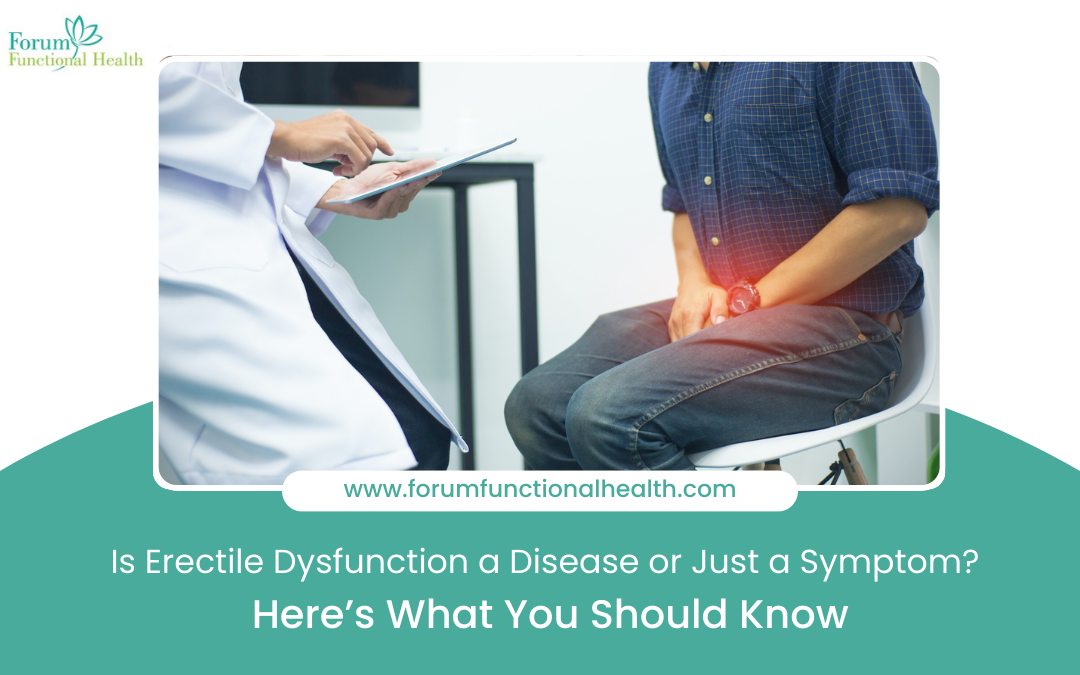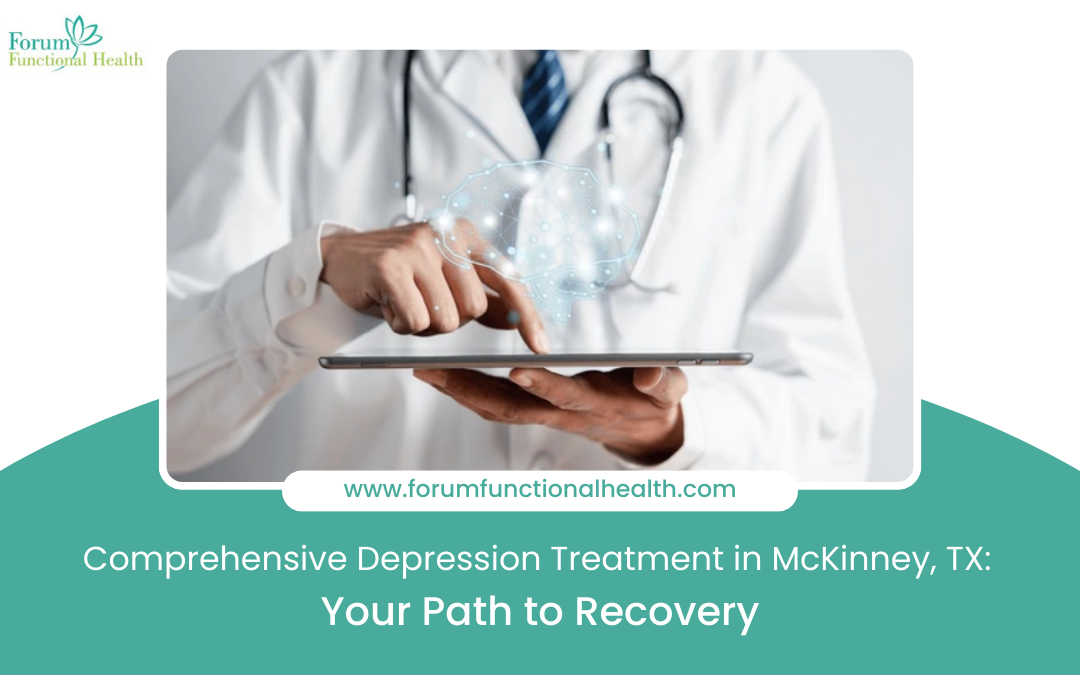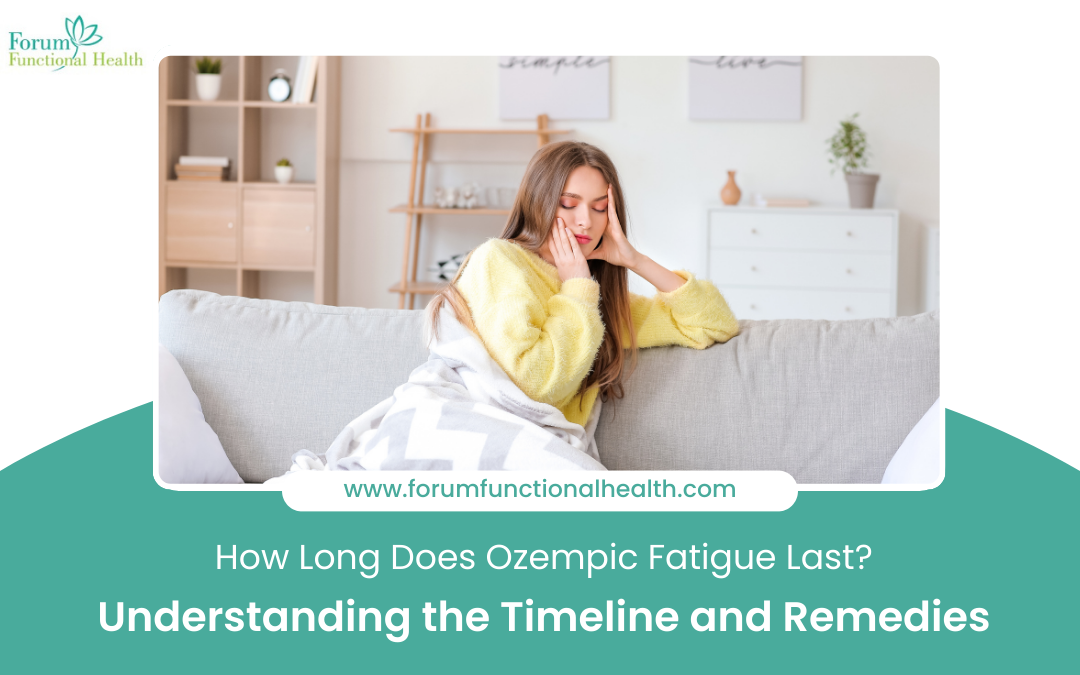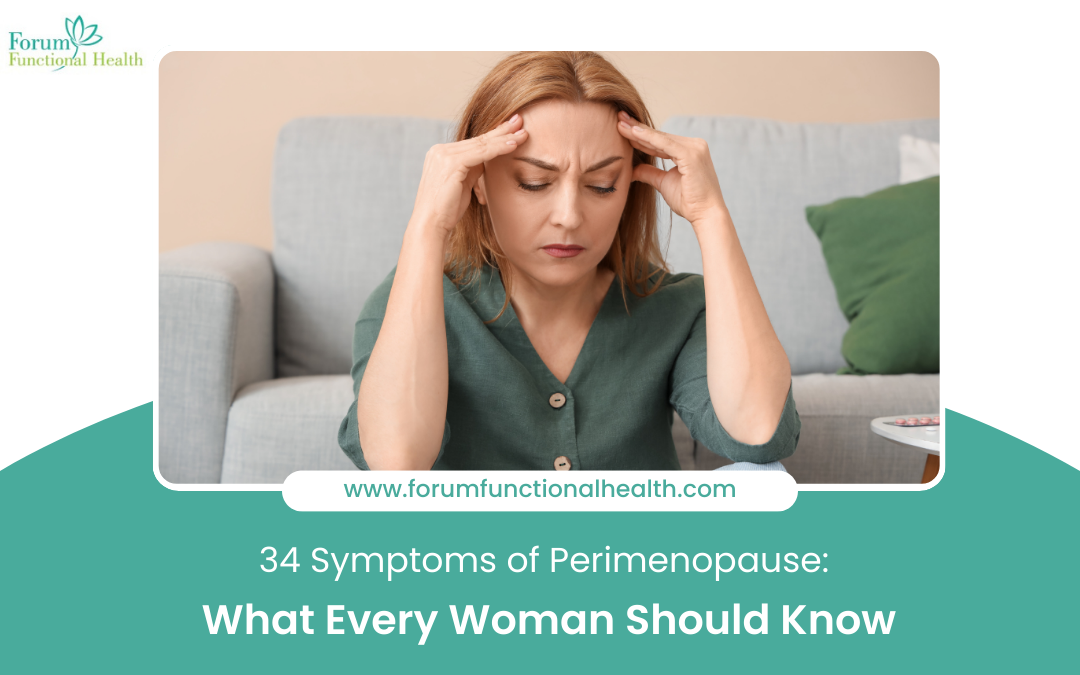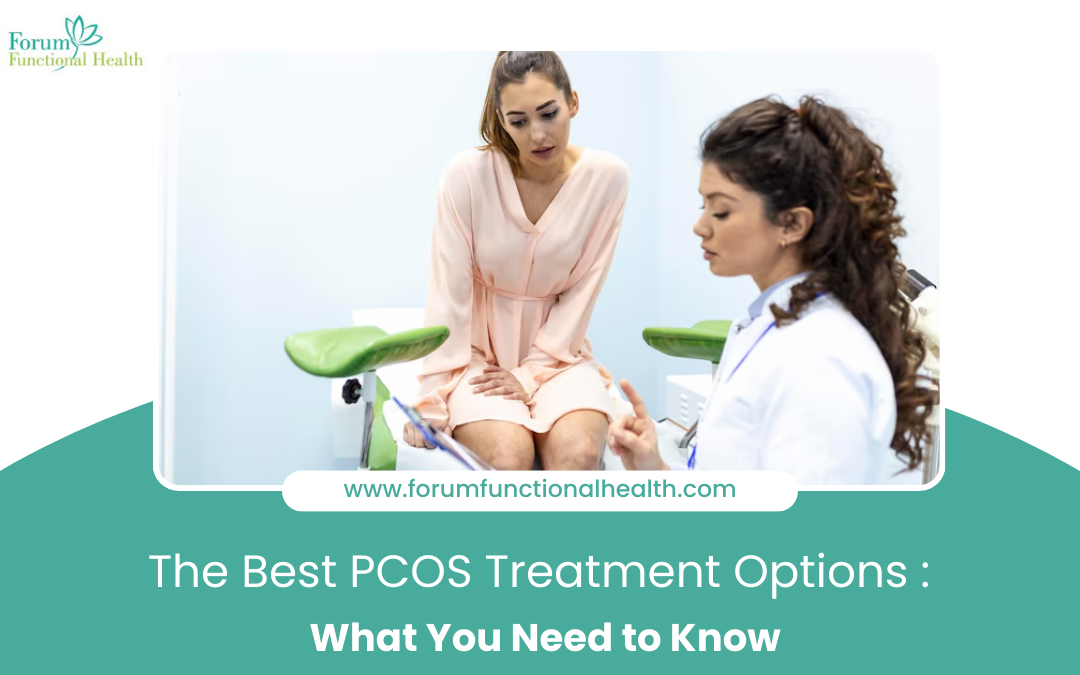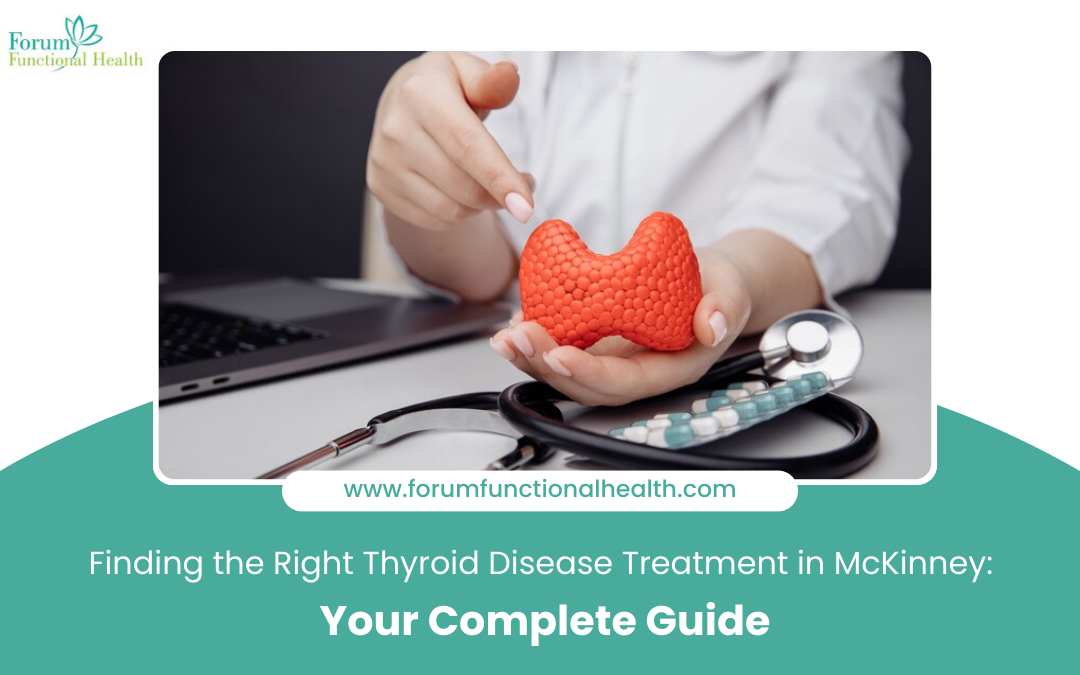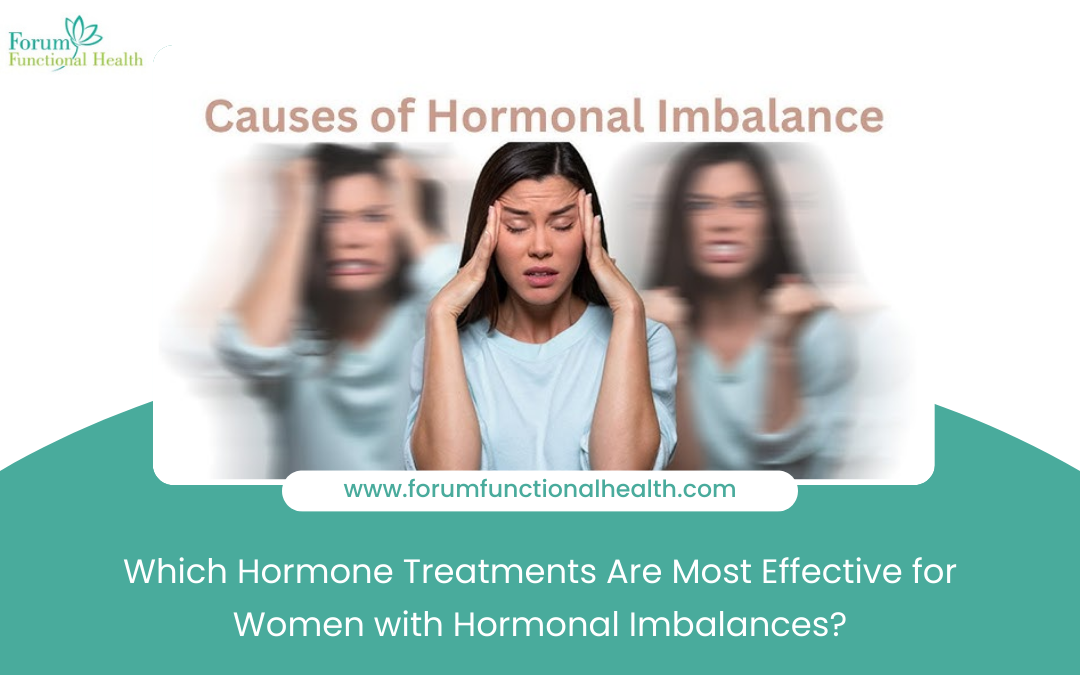
by Forum Functional Health Center | Dec 6, 2024 | Hormonal Imbalance
Hormonal imbalances can significantly impact a woman’s physical and emotional well-being. These symptoms often go unnoticed until they disrupt daily life. Understanding the signs and exploring effective treatments can profoundly affect managing this condition.
What Are Hormonal Imbalance Treatment?
Hormonal imbalance occurs when there’s too much or too little of a specific hormone in your body. For women, these imbalances can stem from conditions like menopause, polycystic ovary syndrome (PCOS), thyroid disorders, or stress.
Common hormonal imbalance symptoms in females include:
- Irregular menstrual cycles
- Fatigue and low energy
- Mood swings and anxiety
- Weight gain or difficulty losing weight
- Hair thinning or excessive hair growth
- Decreased libido
- Insomnia or disrupted sleep patterns
If left untreated, these symptoms can lead to more serious issues like osteoporosis, heart disease, and infertility.
Emotional Impact of Hormonal Imbalance
Women dealing with hormonal imbalances often experience a rollercoaster of emotions. Mood swings, irritability, and feelings of sadness can strain personal relationships and hinder professional productivity. These emotional challenges are just as important to address as physical symptoms.
How Hormonal Imbalances Affect Overall Health
Hormonal imbalance doesn’t only affect mood or weight; it can disrupt several essential bodily functions. For instance:
- Bone Health: Low estrogen levels can weaken bones, increasing the risk of fractures.
- Heart Health: Hormonal changes may lead to high cholesterol and an elevated risk of cardiovascular disease.
- Reproductive Health: Imbalances can cause fertility problems and complications during pregnancy.
Effective Treatments for Hormonal Imbalance
Thankfully, numerous treatments are available to restore balance and improve quality of life.
1. Hormone Replacement Therapy (HRT)
HRT is a popular solution for managing hormonal imbalance symptoms, especially during menopause. It helps replace the hormones your body no longer produces, alleviating symptoms like hot flashes, mood swings, and vaginal dryness.
Targeted hormone therapy can address specific issues such as estrogen or progesterone deficiencies. Seeking professional guidance from a Functional Health Center in Texas ensures personalized care for your unique needs.
3. Supplements for Hormonal Imbalance
Nutritional supplements can support hormone health. For example:
- Vitamin D for bone health
- Magnesium for mood stability
- Omega-3 fatty acids for heart and brain health
4. Lifestyle Changes
Adopting a healthy lifestyle can significantly improve hormonal balance. Focus on:
- Balanced Diet: Include leafy greens, lean proteins, and whole grains.
- Regular Exercise: Engage in activities like yoga or strength training.
- Stress Management: Practices like meditation and deep breathing can reduce cortisol levels.
5. Professional Hormonal Imbalance Treatment
If symptoms persist, consider visiting a trusted clinic. The Hormonal Imbalance Treatment in Texas offers expert care to address your condition effectively.
Why Choose a Functional Health Center for Hormonal Imbalance Treatment?
A Functional Health Center in Texas takes a holistic approach to hormonal health. They focus on identifying the root cause of the imbalance and creating a personalized treatment plan that includes natural remedies, advanced therapies, and emotional support.
Living Your Best Life with Balanced Hormones
Dealing with hormonal imbalance can feel overwhelming, but the right treatment plan can restore your vitality and confidence. Remember, you don’t have to endure these symptoms in silence. Take charge of your health today by exploring options like hormone replacement therapy and lifestyle changes.
If you’re struggling with hormonal imbalance symptoms, contact a reputable clinic such as Forum Functional Health Center to begin your journey toward optimal health.
Final Thoughts
Hormonal imbalances are more common than many women realize, but they don’t have to dictate your life. You can find relief and regain control with treatments ranging from HRT to supplements and personalized care at a Functional Health Center in Texas.
Call to Action:
Ready to take the next step? Explore Hormonal Imbalance Treatment in Texas to learn how professional care can transform your health. Contact Forum Functional Health Center in Texas.
Read More: Is Erectile Dysfunction a Disease or Just a Symptom? Here’s What You Should Know

by Forum Functional Health Center | Dec 4, 2024 | Erectile Dysfunction
Erectile Dysfunction (ED) is often a misunderstood condition. Some perceive it as a standalone disease, while others see it as a symptom of an underlying health issue. Understanding ED is crucial not only for the individuals affected but also for their partners. This guide will delve into the nature of ED, its symptoms, and effective treatments, providing clarity and support for those seeking answers.
What Is Erectile Dysfunction?
Erectile Dysfunction, commonly known as ED, refers to the inability to achieve or maintain an erection firm enough for sexual intercourse. While it’s often dismissed as a normal part of aging, ED can signal more severe health problems, such as heart disease, diabetes, or hormonal imbalances.
Erectile Dysfunction: Disease or Symptom?
The debate on whether ED is a disease or a symptom hinges on its root cause. In some cases, ED is a direct result of vascular or neurological diseases, making it a condition in itself. However, it can also be a symptom of broader health issues, such as stress, depression, or hormonal imbalance. Seeking help from a Functional Health Center in Texas can help identify the underlying cause.
Erectile Dysfunction Symptoms You Shouldn’t Ignore
Recognizing ED symptoms early can lead to prompt treatment. Common erectile dysfunction symptoms include:
- Difficulty achieving an erection
- Trouble maintaining an erection
- Reduced sexual desire
If these symptoms persist, they might indicate more significant health concerns.
Is Erectile Dysfunction Permanent?
Many wonder, Is erectile dysfunction permanent? The answer varies. In some cases, ED is temporary, caused by factors like stress or lifestyle choices. However, when linked to chronic health conditions, it can be permanent. Fortunately, treatments are available, and ED can be effectively managed with the right care.
Exploring ED Disease Symptoms and Impotence Symptoms
ED and impotence are often used interchangeably, but they differ slightly. While ED focuses on the inability to maintain an erection, impotence also includes issues like lack of sexual desire. Identifying ED disease symptoms early is vital for effective intervention.
Finding a Permanent Cure for Erectile Dysfunction
Many patients seek a permanent cure for erectile dysfunction, and advances in medicine offer promising solutions. Lifestyle changes, such as improved diet, regular exercise, and stress management, play a crucial role. Additionally, professional support from ED Treatment in Texas can guide you toward the most suitable options.
Popular ED Treatments and Medications
From oral ED medications to lifestyle adjustments, several treatments are available to manage ED. These include:
- PDE5 inhibitors like Viagra and Cialis
- Testosterone replacement therapy
- Psychological counseling
Consulting with experienced ED Doctors ensures a personalized treatment plan tailored to your needs.
The Role of Erectile Dysfunction Forums
Online erectile dysfunction forums offer a safe space for individuals to share experiences and seek advice. They can provide emotional support, practical tips, and updates on the latest treatments.
Is There Hope for a Cure?
Yes, there is hope. While some forms of ED may be persistent, numerous treatment options offer relief and improved quality of life. Seeking help early and exploring holistic solutions with professionals can make a significant difference.
Why You Should Seek Professional Help
Ignoring ED can lead to more severe complications, including relationship issues and decreased self-esteem. Consulting a trusted healthcare provider, like those at the Functional Health Center in Texas, ensures you get the right diagnosis and treatment.
Final Thoughts
Erectile Dysfunction is more than just a physical condition; it impacts emotional well-being and relationships. Whether it’s a disease or a symptom, addressing ED promptly with the right support system is crucial. If you’re experiencing ED symptoms, don’t hesitate to seek help from experts who can guide you toward a healthier, more fulfilling life. Contact Forum Functional Health in Texas.
Read More: How Long Does Ozempic Fatigue Last? Understanding Duration and Management

by Forum Functional Health Center | Dec 2, 2024 | Depression
Depression affects millions of people worldwide, and its impact can be debilitating. From persistent sadness to loss of interest in daily activities, the symptoms of depression can take a toll on your emotional and physical well-being. However, seeking depression treatment in McKinney, TX is a critical step toward reclaiming your life and finding hope. At Forum Functional Health Center, we offer compassionate care tailored to your unique needs.
Understanding Depression: Definition and Symptoms
What is Depression?
Depression, also known as clinical depression, is a serious mental health condition that extends beyond temporary feelings of sadness. It is characterized by a persistent low mood, lack of energy, and loss of interest in previously enjoyable activities.
Symptoms of Depression in Women and Men
Depression manifests differently in everyone, but some common depression symptoms include:
- Persistent feelings of sadness or emptiness
- Changes in sleep patterns (insomnia or oversleeping)
- Loss of appetite or overeating
- Fatigue or low energy levels
- Difficulty concentrating
- Feelings of worthlessness or excessive guilt
- Thoughts of self-harm or suicide
For women, hormonal changes can exacerbate symptoms, making it essential to recognize the symptoms of depression in women and seek timely help.
Early recognition of the signs of depression is crucial. If you or a loved one experiences symptoms that interfere with daily life, it’s time to consider professional support. Seeking depression therapy can be life-changing.
Why Choose Depression Treatment in McKinney, TX?
McKinney, TX, is home to the reputable Forum Functional Health Center, where personalized care meets innovative treatment approaches. Our center focuses on holistic and natural methods, ensuring that each patient receives the best care for their specific needs.
Depression Treatment in McKinney, TX provides a safe environment where patients can explore various therapies and strategies for recovery. From cognitive behavioral therapy to lifestyle modifications, we’re dedicated to guiding you on your journey.
Comprehensive Depression Therapy Options
Tailored Approaches to Recovery
Our Functional Health Center in Texas offers a range of treatment options:
- Cognitive Behavioral Therapy (CBT): Helps patients identify and change negative thought patterns.
- Lifestyle Adjustments: Focus on improving sleep, nutrition, and physical activity.
- Mindfulness and Meditation: Techniques to manage stress and improve mental clarity.
- Supplementation and Natural Remedies: Support your body’s natural healing processes.
Discover more about our services by visiting our Functional Health Center in Texas.
Tackling Clinical Depression Head-On
For those diagnosed with clinical depression, it’s important to follow a structured treatment plan. Regular therapy sessions, combined with lifestyle changes, can lead to significant improvements in mental health.
How Depression Treatment in Texas Can Change Your Life
Whether you’re struggling with mild or severe depression, seeking professional help is the first step toward recovery. With the right treatment, many individuals regain their confidence, rediscover joy, and improve their overall quality of life.
At Forum Functional Health Center, we believe in empowering our patients. Our holistic approach not only targets the symptoms but also addresses underlying causes, promoting lasting recovery.
Recognizing the Need for Depression Help in McKinney
If you’re searching for depression help McKinney or feeling overwhelmed by your symptoms, know that you’re not alone. Our team is here to provide the care and support you need to thrive.
Take the First Step Toward Recovery Today
Your journey to better mental health starts with a simple step—reaching out for help. At Forum Functional Health Center, we’re committed to helping you overcome depression and lead a fulfilling life.
Contact us today to learn more about our Depression Treatment in McKinney, TX. Together, we can pave the path to recovery and restore hope—contact Forum Functional Health in Texas.
Read More: Effective Treatment for Female Infertility: Options and Success Rates

by Forum Functional Health Center | Nov 29, 2024 | Infertility
Infertility is a deeply emotional journey for many women, often filled with uncertainty and longing. Fortunately, advances in medical science offer a variety of effective treatments for female infertility. Whether you’re struggling with ovulation disorders, hormonal imbalances, or conditions like PCOS, there is hope. Let’s explore the options, success rates, and how to take the first step toward building your family.
Understanding Female Infertility
Female infertility can result from several factors, including ovulation disorders, fallopian tube damage, or hormonal imbalances. One common cause is polycystic ovary syndrome (PCOS). But why does PCOS cause infertility? PCOS interferes with ovulation, leading to irregular periods and making it harder to conceive. Other causes may include endometriosis, uterine fibroids, or age-related factors.
Common Infertility Symptoms and Testing
Recognizing the signs of infertility early can improve treatment outcomes. Symptoms like irregular menstrual cycles, painful periods, or difficulty conceiving after a year of unprotected intercourse warrant medical attention.
At the Functional Health Center in Texas, we offer comprehensive infertility testing for women, including hormone evaluations and imaging studies. These tests help pinpoint the underlying cause, allowing for personalized treatment plans.
Treatment Options for Female Infertility
The right treatment depends on the cause of infertility. Here are some of the most effective methods:
Medications like Clomiphene, Letrozole, or injectable gonadotropins stimulate ovulation. These are often the first line of treatment for women with ovulatory disorders.
2. Lifestyle Modifications and Hormonal Therapy
Addressing lifestyle factors such as diet, exercise, and stress management can improve fertility outcomes. Hormonal therapies may also regulate cycles and improve ovulation.
3. Assisted Reproductive Technologies (ART)
Procedures like Intrauterine Insemination (IUI) and In Vitro Fertilization (IVF) have high success rates, especially for women with tubal issues or unexplained infertility. In Texas, many women find success with these advanced treatments.
4. Surgical Interventions
In cases where structural issues like fibroids or endometriosis are present, surgical correction may be necessary. Minimally invasive techniques can improve fertility and overall reproductive health.
At the Treatment for Female Infertility & Hormonal Imbalances in Texas, our specialists tailor each treatment to meet individual needs, maximizing the chances of conception.
Success Rates: What to Expect
Success rates vary depending on the treatment and individual circumstances.
- Fertility medications: Success rates range from 20% to 60%, depending on the patient’s age and underlying condition.
- IUI: Success rates range from 10% to 20% per cycle.
- IVF: Offers a success rate of 40% or higher for women under 35.
While these numbers provide a general guide, each woman’s journey is unique.
Emotional Support During Treatment
The journey through infertility treatment can be emotionally taxing. It’s crucial to build a support network of healthcare providers, family, and friends. Counseling or joining support groups can also provide comfort and resilience.
At the Forum Functional Health Center, we prioritize holistic care, addressing both physical and emotional aspects of infertility.
Take the First Step Today
If you’re struggling with infertility, remember that you’re not alone. Modern medical advancements offer a range of effective treatments tailored to your unique needs. Whether you need infertility testing for women, hormonal therapy, or advanced reproductive technologies, help is available.
Visit our Functional Health Center in Texas today and begin your journey toward parenthood with confidence and hope.
Explore More: How Long Does Ozempic Fatigue Last? Understanding the Timeline and Remedies

by Forum Functional Health Center | Nov 27, 2024 | Fatigue
Ozempic, a widely prescribed medication for type 2 diabetes and weight management, has been a game-changer for many. However, some users experience a less-than-welcome side effect: Ozempic fatigue. If you’ve been asking yourself, how long does Ozempic fatigue last? you’re not alone. Fatigue can disrupt your daily life, leaving you drained and frustrated. But don’t worry—there are ways to manage and combat this. At Forum Functional Health Center, we understand how crucial it is to feel energized and healthy. Let’s dive deeper into this side effect and explore remedies that can help.
What Is Ozempic Fatigue?
Ozempic fatigue refers to the persistent tiredness or exhaustion that some people experience while using this medication. It’s one of the common side effects of semaglutide, the active ingredient in Ozempic. This fatigue may be mild for some but debilitating for others, affecting their ability to work, exercise, or enjoy daily activities.
How Long Does Ozempic Fatigue Last?
The duration of Ozempic fatigue varies from person to person. Typically, users report that fatigue is most intense during the initial weeks of treatment. As your body adjusts to the medication, the fatigue often subsides within 4 to 6 weeks. However, some individuals may experience semaglutide fatigue for a longer period, especially if they’re also managing other conditions like high cholesterol or chronic fatigue syndrome.
Can High Cholesterol Cause Fatigue?
Yes, high cholesterol can cause fatigue, as it impacts blood flow and can lead to conditions like heart disease, which reduces your energy levels. If you’re dealing with both high cholesterol and Ozempic side effects of fatigue, it’s essential to manage both conditions to improve your overall energy levels.
Effective Remedies for Ozempic Fatigue
If you’re wondering about an Ozempic fatigue remedy, here are some strategies that can help:
1. Prioritize Rest and Recovery
Fatigue is your body’s way of signaling that it needs rest. Ensure you’re getting 7-9 hours of quality sleep each night to help combat fatigue from Ozempic.
2. Maintain a Balanced Diet
Focus on nutrient-rich foods to fuel your body. Incorporate lean proteins, whole grains, and plenty of fruits and vegetables. Avoid processed sugars, which can cause energy crashes.
3. Stay Hydrated
Dehydration can worsen fatigue. Make sure to drink enough water throughout the day, especially if you’re increasing your fiber intake with Ozempic.
4. Incorporate Light Exercise
While it might seem counterintuitive, light exercise can help boost energy levels. Start with gentle activities like walking or yoga to improve blood circulation and combat tiredness.
5. Explore Professional Help
If your fatigue persists, consider seeking professional treatment. Fatigue Treatment in Texas offers comprehensive solutions to help you regain your energy and vitality.
Understanding Fatigue Risk Management System
Managing fatigue isn’t just about remedies; it’s about adopting a sustainable approach to energy management. A Fatigue Risk Management System involves identifying factors contributing to fatigue, implementing strategies to reduce it, and monitoring progress. This system can be tailored to your lifestyle and needs, ensuring long-term benefits.
Chronic Fatigue Syndrome vs. Ozempic Fatigue
It’s essential to differentiate between chronic fatigue syndrome treatment and managing Ozempic fatigue. Chronic fatigue syndrome (CFS) is a long-term condition characterized by extreme fatigue that doesn’t improve with rest. On the other hand, Ozempic fatigue is typically temporary and linked directly to medication use. However, if you suspect you might have CFS, seeking professional help is crucial. At Forum Functional Health Center, we specialize in both chronic fatigue treatment and Fatigue Treatment in McKinney, TX.
Tips for Managing Ozempic Fatigue
1. Monitor Your Symptoms
Keep a journal to track your fatigue levels. Note when your energy dips and spikes to identify patterns and triggers.
2. Communicate with Your Healthcare Provider
Discuss your symptoms with your doctor. They might adjust your Ozempic dosage or recommend additional tests to rule out other causes of fatigue.
3. Practice Mindfulness and Stress Management
Stress can exacerbate fatigue. Incorporate relaxation techniques like meditation or deep breathing exercises into your daily routine.
When to Seek Professional Help
If your fatigue persists beyond the typical adjustment period or severely impacts your quality of life, don’t hesitate to seek professional assistance. Our team at Functional Health Center in Texas is here to help. We offer personalized treatment plans that address the root causes of fatigue, ensuring you feel your best.
Conclusion
Dealing with Ozempic fatigue can be challenging, but understanding its timeline and remedies can make a significant difference. Whether it lasts a few weeks or lingers longer, there are effective strategies to combat it. Remember, you don’t have to navigate this journey alone. Explore Fatigue Treatment in Texas and regain your energy and vitality today.
Feel better, live better, and let us help you on your journey to wellness.
Call to Action
For more personalized solutions, visit the Forum Functional Health Center and discover how we can support your health goals. Contact Forum Functional Health in Texas.
Explore More: 34 Symptoms of Perimenopause: What Every Woman Should Know

by Forum Functional Health Center | Nov 25, 2024 | Fatigue
Perimenopause is a transitional phase marking the end of a woman’s reproductive years, bringing a myriad of physical and emotional changes. Understanding these symptoms can help you navigate this journey confidently and seek appropriate support.
What is Perimenopause?
Perimenopause is the stage leading up to menopause, during which a woman’s body undergoes hormonal changes. These fluctuations can start as early as the late 30s and last several years. Knowing the signs can help you take charge of your health and explore options like Perimenopause Treatment in Texas to improve your quality of life.
34 Symptoms of Perimenopause
Perimenopause can present a diverse array of symptoms. Here’s what every woman should know:
1. Irregular Periods
Changes in menstrual cycles, including missed periods or heavier/lighter flows, are among the earliest signs.
2. Hot Flashes
Sudden waves of heat, often accompanied by sweating, can disrupt daily life and sleep patterns.
3. Night Sweats
Waking up drenched in sweat is a common and frustrating experience.
4. Perimenopause Fatigue
Persistent tiredness and low energy levels can affect productivity and mood.
5. Mood Swings
Hormonal changes often lead to heightened emotions, including anxiety and irritability.
6. Sleep Disturbances
Difficulty falling asleep or staying asleep becomes a frequent concern.
7. Memory Issues
Brain fog and forgetfulness are common complaints during this stage.
8. Menopause Gastrointestinal Problems
Bloating, indigestion, and changes in bowel habits can arise due to hormonal shifts.
9. Hair Thinning
Hair may become finer or fall out more frequently.
10. Weight Gain
Many women notice weight gain, especially around the abdomen.
11. Decreased Libido
Lowered sex drive is often tied to hormonal imbalances.
Other Symptoms Include: Breast tenderness
-
- Vaginal dryness
- Joint pain
- Skin changes
- Increased sensitivity to temperature
- Heart palpitations
- Depression
- Frequent headaches
- Dizziness
- Frequent urination
- Muscle aches
- Food cravings
- Irritability
- Changes in vision
- Tinnitus (ringing in ears)
- Allergies worsening
- Dry mouth
- Burning tongue sensation
- Changes in taste or smell
- Gum problems
- Tingling in extremities
- Blood sugar fluctuations
- Signs Perimenopause is Ending
If you notice these symptoms, consulting with a healthcare provider is essential. You can find expert help at the Functional Health Center in Texas, which offers tailored treatments to ease this transition.
Addressing the symptoms of perimenopause involves a mix of lifestyle changes, medical interventions, and emotional support.
1. Perimenopause Hormone Therapy
Hormone therapy can balance estrogen and progesterone levels, alleviating symptoms like hot flashes and mood swings.
2. Perimenopause Therapy in McKinney
Local clinics provide therapy focused on both physical and emotional well-being. The Forum Functional Health Center is a trusted choice for women seeking Menopause Treatment for Women.
3. Lifestyle Adjustments
- Diet: Incorporating calcium, vitamin D, and healthy fats can strengthen bones and stabilize hormones.
- Exercise: Regular physical activity helps manage weight and improves mood.
- Stress Management: Techniques like yoga and meditation can reduce anxiety and promote relaxation.
Navigating the Emotional Impact
Perimenopause often brings feelings of uncertainty. Participating in a Perimenopause Forum or joining support groups can help you connect with others experiencing similar challenges. Many women share inspiring stories like, I got pregnant during perimenopause forum, which shows hope and resilience during this phase.
If you’re looking for tailored advice, explore Premenopause, Perimenopause, and Menopause Issues in Texas for expert guidance.
Signs Perimenopause is Ending
How do you know when this phase is over? Indicators such as the absence of menstrual periods for 12 months and a reduction in symptoms signify the transition to menopause. You can read more about these changes on a Signs Perimenopause is Ending Forum for firsthand insights.
Why Seek Professional Help?
Navigating perimenopause can be overwhelming, but professional care ensures you’re not alone. Facilities like the Functional Health Center in Texas offer advanced diagnostic tools and personalized treatment plans, empowering you to embrace this phase with confidence.
Take the Next Step
Perimenopause is a natural transition, but it doesn’t have to be a struggle. Whether you’re dealing with perimenopause fatigue, gastrointestinal issues, or emotional challenges, support is just a step away. Visit the Forum Functional Health Center to explore treatments tailored to your needs.
Explore More: The Best PCOS Treatment Options: What You Need to Know

by Forum Functional Health Center | Nov 22, 2024 | Polycystic ovary syndrome (PCOS)
Polycystic Ovary Syndrome (PCOS) is one of the most common hormonal disorders affecting women, but the good news is that it can be managed effectively with the right treatment. Whether you’re struggling with PCOS symptoms or are just starting to explore your treatment options, it’s important to understand the most effective ways to manage this condition and improve your quality of life.
In this post, we’ll walk you through the best PCOS treatment options available, including medication, lifestyle changes, and natural remedies, to help you regain control over your health and well-being.
Understanding PCOS: Symptoms and Causes
Polycystic Ovary Syndrome (PCOS) is a hormonal condition that affects women’s ovaries, disrupting the normal balance of hormones. Women with PCOS often experience a range of symptoms, such as irregular periods, difficulty getting pregnant, weight gain, excessive hair growth, and acne.
Some common PCOS symptoms include:
- Irregular menstrual cycles
- Excessive hair growth (hirsutism)
- Ovarian cysts detected through ultrasound
- Thinning hair or hair loss
- Acne or oily skin
- Difficulty losing weight
These polycystic ovary syndrome symptoms can be distressing, but with the right PCOS treatment, many women experience significant relief and improved health.
Best PCOS Treatment Options: A Holistic Approach
Treating PCOS involves a combination of medication, lifestyle changes, and sometimes surgery. While there is no cure for PCOS, various treatments can help manage symptoms and improve overall well-being.
1. PCOS Medication: Hormonal Therapy
One of the most common treatments for PCOS is hormonal therapy. PCOS medication, including birth control pills or hormonal IUDs, helps regulate menstrual cycles, reduce excess hair growth, and manage acne. These treatments work by balancing the hormones that are out of sync in women with PCOS.
For women looking to regulate their periods or control unwanted hair growth, hormonal therapies can be highly effective. However, it’s essential to consult a healthcare professional to determine the right medication based on your symptoms and health goals.
2. PCOS Treatment for Weight Loss: Lifestyle Changes
Polycystic ovary syndrome weight loss can be challenging, but it’s an important part of managing the condition. Maintaining a healthy weight can help regulate menstrual cycles, improve insulin sensitivity, and reduce the risk of developing type 2 diabetes.
Lifestyle changes such as regular exercise and a balanced, healthy diet are key components of managing PCOS. Focus on whole foods, such as fruits, vegetables, lean proteins, and whole grains, and avoid processed foods and sugar. Incorporating strength training and cardio exercises can improve metabolic health and aid in weight loss.
While weight loss can be difficult for women with PCOS, small changes can make a big difference. Working with a nutritionist or a health coach specializing in PCOS can provide the personalized support you need to achieve your health goals.
3. Metformin: Medication for Insulin Resistance
Insulin resistance is common in women with PCOS, leading to weight gain, fatigue, and even diabetes. Metformin, a medication often prescribed for type 2 diabetes, can help reduce insulin resistance. By improving how your body processes insulin, metformin can help with PCOS medication and weight loss, as well as help regulate menstrual cycles.
Metformin is often recommended for women with PCOS who are overweight or struggling to conceive, as it can also help improve fertility. Talk to your doctor about whether this medication is right for you.
4. Fertility Treatment: Supporting Pregnancy Goals
If you’re trying to conceive and have been diagnosed with PCOS, fertility treatments may be necessary. Women with PCOS often experience difficulty getting pregnant due to irregular ovulation. Polycystic ovary treatment for fertility usually involves medications such as clomiphene citrate (Clomid) or letrozole to stimulate ovulation.
In some cases, women with PCOS may require more advanced fertility treatments like in-vitro fertilization (IVF) to achieve pregnancy. It’s important to work closely with a fertility specialist to develop a treatment plan tailored to your needs.
5. Surgical Options: Ovarian Drilling
In rare cases, surgery may be recommended for women with PCOS who are struggling with infertility or other severe symptoms. Polycystic ovary treatment through a procedure known as ovarian drilling involves making small holes in the ovaries to restore normal hormonal balance and improve ovulation.
Ovarian drilling can be a successful option for women who haven’t responded to medication and are seeking fertility treatment. However, it is typically reserved for those who have not had success with other treatments.
Natural Remedies and Lifestyle Changes for PCOS
Many women with PCOS also seek natural treatments and lifestyle changes to complement traditional medical options. While these remedies may not work for everyone, some women find relief from symptoms through diet, exercise, and stress management.
1. Dietary Changes
Following an anti-inflammatory diet can help manage polycystic ovaries syndrome and regulate hormones. Focus on foods that promote hormonal balance, such as:
- Omega-3-rich foods like fish, flaxseeds, and walnuts
- Low-glycemic foods to help manage blood sugar levels
- Anti-inflammatory herbs and spices like turmeric and cinnamon
2. Exercise and Stress Management
Regular exercise, particularly strength training, and aerobic exercises, can help regulate insulin levels, reduce stress, and promote weight loss. Additionally, managing stress through mindfulness practices, meditation, or yoga can help reduce the impact of PCOS on your overall well-being.
3. Supplements
Some women with PCOS find that supplements such as inositol, vitamin D, and magnesium help manage their symptoms. These supplements support hormonal balance and may help regulate menstrual cycles and improve insulin sensitivity. Always talk to your doctor before starting any new supplements.
Seek Professional Help: Functional Health Centers
Managing PCOS effectively requires a personalized approach, and it’s essential to seek professional guidance. If you’re looking for comprehensive care, a Functional Health Center in Texas may be the ideal place for you. At the Forum Functional Health Center, we provide individualized care that addresses the root causes of PCOS and helps you develop a treatment plan tailored to your needs.
Conclusion: Empowering Your PCOS Journey
While PCOS can be overwhelming, understanding the best treatment options available can help you take control of your health. From PCOS medication to lifestyle changes, there are many ways to manage this condition and live a full, healthy life. Whether you’re seeking polycystic ovary syndrome (PCOS) treatment in Texas or exploring natural remedies, the most important thing is to seek support from healthcare professionals who understand your unique needs.
If you’re struggling with PCOS, we encourage you to reach out for personalized care at the Forum Functional Health Center, where we provide expert guidance and support every step of the way.
For more information on polycystic ovary syndrome (PCOS) treatment in Texas, visit our specialized page here.
Remember, you’re not alone on this journey – with the right treatment plan, you can take steps toward better health and well-being.
Read More: Finding the Right Thyroid Disease Treatment in Mckinney: Your Complete Guide

by Forum Functional Health Center | Nov 20, 2024 | Thyroid disease
Living with thyroid disease can be challenging and life-altering, from managing overwhelming fatigue to facing sudden weight changes and emotional struggles. If you’re searching for effective thyroid disease treatment in McKinney, TX, you’ve come to the right place. This guide will walk you through your treatment options, with a focus on finding a Functional Health Center in Texas and connecting with professionals like a functional medicine doctor thyroid McKinney TX. Let’s explore your path to better health and well-being.
Understanding Thyroid Disease
Thyroid disease encompasses a range of issues that affect your thyroid gland, a small but mighty organ in your neck. When your thyroid isn’t functioning correctly, it can lead to conditions like hypothyroidism, Hashimoto’s disease, and thyroid eye disease. These problems can drastically impact your quality of life, but hope is not lost.
Symptoms to Watch Out For
Early detection is critical when it comes to managing thyroid disease. Here are some thyroid disease symptoms to be aware of:
- Fatigue and weakness
- Weight gain or difficulty losing weight
- Dry skin and hair loss
- Mood swings, depression, or anxiety
- Sensitivity to cold
- Irregular menstrual cycles
If you notice these symptoms, don’t delay seeking professional help. A functional medicine doctor thyroid Texas specialist can guide you in pinpointing the root cause of your issues.
Types of Thyroid Problems
Thyroid disease can present in several forms, each requiring different treatments:
- Hypothyroidism: An underactive thyroid that can cause fatigue and sluggish metabolism.
- Hyperthyroidism: An overactive thyroid leading to rapid heartbeat and weight loss.
- Hashimoto’s Disease: An autoimmune condition causing chronic thyroid inflammation.
- Thyroid Eye Disease: An eye condition that sometimes accompanies autoimmune thyroid problems.
Why Functional Medicine Is Different
When it comes to treating thyroid problems, traditional medicine often focuses on managing symptoms rather than finding the root cause. Functional medicine, on the other hand, takes a holistic approach, addressing the underlying issues impacting your thyroid health. At a Functional Health Center in Texas, you can expect personalized care, looking beyond test results to understand your unique needs.
For a deeper dive into this approach, check out the Functional Health Center in Texas.
Finding the Best Thyroid Disease Treatment in McKinney
So, how do you choose the best thyroid disease treatment in McKinney? Here’s what to look for:
- Comprehensive Testing: Your doctor should run detailed tests to evaluate your thyroid function, hormones, and immune response.
- Customized Treatment Plans: A functional medicine doctor will design a personalized plan that may include diet changes, lifestyle modifications, and supplements to balance your thyroid hormones.
- Focus on Gut Health: Did you know that gut health and thyroid function are closely linked? Your treatment may include strategies to heal your gut and reduce inflammation.
- Stress Management: Chronic stress can exacerbate thyroid issues. Functional medicine incorporates stress-reducing practices like yoga, meditation, or counseling.
The Role of a Functional Medicine Doctor
A functional medicine doctor thyroid McKinney TX can play a crucial role in your recovery. These specialists treat the whole person, not just the symptoms. They’ll ask about your medical history, stress levels, and even your diet to develop a targeted treatment plan.
For more details on available treatments, visit Thyroid Disease Treatment in Texas.
Coping with Thyroid Eye Disease
Thyroid eye disease is a condition that causes swelling and inflammation of the eye muscles. It can be particularly distressing, but there are treatments available to ease your discomfort and improve your quality of life. Treatments can include eye drops, medication, and in severe cases, surgery. Managing stress and following a healthy diet also helps in reducing symptoms.
Managing Hypothyroidism Symptoms
Living with hypothyroidism symptoms like fatigue, weight gain, and brain fog can feel isolating. You might feel misunderstood or frustrated by the limitations your condition imposes. But remember, you’re not alone, and effective treatment is within reach. Hypothyroidism treatments often include hormone replacement therapy, but a holistic approach ensures your body is functioning optimally.
Hashimoto’s Disease and Your Immune System
Hashimoto’s disease is the most common cause of hypothyroidism, and it’s an autoimmune disorder. This means your immune system mistakenly attacks your thyroid, leading to inflammation. Treatment often involves a combination of medication and lifestyle changes, like an anti-inflammatory diet and stress reduction techniques.
Take Charge of Your Thyroid Health
Taking control of your thyroid health starts with understanding your condition and seeking the right treatment. Visiting a Functional Health Center in Texas can offer a new perspective on your health journey. Here, you’ll get access to personalized care that considers your entire body, not just your thyroid.
Were you feeling overwhelmed? Don’t worry—taking the first step is the hardest part. Once you start your journey toward wellness, things will gradually get easier. Remember, your well-being is worth every effort.
Conclusion
Living with thyroid disease doesn’t have to be a life sentence of discomfort and frustration. You can reclaim your health and happiness with the right support and a personalized treatment plan from a functional medicine doctor Thyroid Texas. For comprehensive care and more information, visit Thyroid Disease Treatment in Texas.
Your journey to better thyroid health is just beginning. Take the first step today!
Export More: Discover Effective Weight Loss Management Treatments

by Forum Functional Health Center | Nov 18, 2024 | Weight Management
Achieving your weight loss goals can be challenging, especially with the overwhelming amount of information and programs available today. But with personalized, medically supervised treatments, the journey becomes more structured, efficient, and successful. If you’ve been struggling with traditional weight loss methods, it might be time to consider professional options at a Functional Health Center in Texas.
Understanding Weight Loss Management
Weight loss management isn’t just about shedding pounds; it’s about adopting sustainable, healthy lifestyle changes. It’s a holistic approach that addresses diet, exercise, and, in some cases, medical interventions. Clinics like the Forum Functional Health Center offer tailored plans that cater to individual needs, ensuring you receive comprehensive care that leads to lasting results.
Why Choose Medical Weight Loss?
Medical weight loss provides a science-based, supervised path to achieving weight loss goals. Under the guidance of trained professionals, you can explore treatments that include weight loss medications, weight loss injections, and customized programs designed to maximize your chances of success.
- Weight Loss Injections: These can help suppress appetite and increase metabolism, making your weight loss journey more manageable. With professional supervision, you’ll ensure your safety and effectiveness.
- Weight Loss Programs: Tailored to your health profile, these programs include meal planning, exercise regimens, and regular check-ins to track progress.
- Weight Control Supplements: High-quality supplements can enhance your efforts, but it’s crucial to use them under expert supervision to avoid side effects or ineffective products.
Feeling overwhelmed about where to start? Visiting a lose-weight clinic near me can provide you with personalized guidance and support throughout your journey.
Effective Weight Loss Treatments
1. Medical Weight Loss Treatments
At a Functional Health Center in Texas, you’ll find a variety of medical treatments to support weight loss. These include FDA-approved medications like appetite suppressants and metabolic boosters. It’s about more than just a quick fix; it’s a long-term commitment to your health and well-being.
Functional Health Center in Texas offers innovative weight loss strategies to give you the best possible outcomes. A medical professional will monitor your progress, adjust your plan as needed, and provide ongoing motivation.
2. Weight Loss Management Programs
Programs at specialized clinics emphasize both short-term and long-term success. They focus on sustainable habits rather than rapid, temporary results. These clinics take a comprehensive look at your lifestyle and make personalized recommendations for nutrition, exercise, and wellness practices.
One effective option is the Weight Loss Management Treatment in McKinney, TX. By leveraging cutting-edge technologies and treatments, these programs can guide you on how to lose weight fast naturally, and permanently. No gimmicks—just proven methods for real change.
Emotional and Physical Support Throughout Your Journey
Weight loss isn’t just physical; it’s emotional, too. Frustration, self-doubt, and a lack of motivation are common obstacles. That’s why clinics emphasize holistic care. It’s not just about prescribing the best weight loss medication; it’s about offering emotional support and motivation when you need it most.
How to Lose Weight Fast Naturally and Permanently
While medical interventions can be helpful, many individuals also look for natural ways to complement their treatments. Here are some natural strategies that, when combined with professional help, can make a difference:
- Mindful Eating: Practice being aware of what and how much you eat. Slow down, savor each bite, and listen to your body’s hunger cues.
- Consistent Exercise: Engage in a mix of cardio, strength training, and flexibility exercises to keep your body active and your metabolism high.
- Quality Sleep: Insufficient sleep can disrupt hormones that regulate hunger and metabolism. Aim for 7-9 hours per night.
- Stay Hydrated: Drinking enough water supports metabolism and reduces overeating.
Combining these natural approaches with medical weight loss near me can set you on a path to sustainable weight loss and overall wellness.
Choosing the Right Weight Loss Clinic
It’s important to find a lose-weight clinic near me that aligns with your values and needs. Look for clinics that offer a variety of services, from weight loss injections to tailored nutrition advice. Also, prioritize clinics that emphasize personalized care, like the Forum Functional Health Center, where your unique journey is supported every step of the way.
By understanding your body’s needs and having professional guidance, you can finally conquer weight loss challenges and work towards a healthier, more confident version of yourself.
Conclusion
Weight loss is more than just a physical transformation. It’s about improving your overall health, feeling more energized, and gaining confidence. Clinics like the Functional Health Center in Texas offer comprehensive treatments considering your unique body chemistry, lifestyle, and emotional well-being.
Professional support can make all the difference if you’re interested in weight loss management or need guidance on weight loss programs. Take control of your health journey today and explore effective, personalized options at a reputable clinic. Ready to start your transformation? Schedule your consultation and begin your path toward a healthier future.
Read More: Effective Hormone Treatments for Women with Hormonal Imbalances

by Forum Functional Health Center | Nov 15, 2024 | Hormonal Imbalance
Navigating the landscape of hormone treatments can be overwhelming for women dealing with hormonal imbalances. Understanding the causes, symptoms, and most effective treatment options is crucial to reclaiming a healthy, balanced life. Let’s explore the options available to help women regain stability and well-being.
Understanding Hormonal Imbalance in Women
Hormonal imbalances occur when there is too much or too little hormone in the bloodstream. Hormones are essential messengers that influence every aspect of our body, from metabolism to mood. When these hormones are disrupted, women may experience a wide range of symptoms, impacting their quality of life.
Common Causes of Hormonal Imbalance
- Stress and Lifestyle Factors: High stress levels, poor nutrition, and lack of sleep can contribute significantly to hormonal disruptions.
- Aging and Menopause: Women naturally experience changes in hormone levels as they age, especially during menopause.
- Underlying Health Conditions: Conditions like polycystic ovary syndrome (PCOS), thyroid dysfunction, and certain autoimmune diseases can lead to hormonal imbalance.
If you’re experiencing signs of hormonal imbalance, it’s crucial to consult a healthcare provider, such as the Functional Health Center in Texas, to determine the root cause and appropriate treatments.
The symptoms of hormonal imbalance in women can vary widely, often mimicking other health issues. Some of the most common hormonal imbalance symptoms include:
- Mood Swings and Irritability: Sudden emotional shifts can be frustrating and disruptive.
- Fatigue and Sleep Issues: Hormonal fluctuations can cause chronic fatigue and insomnia.
- Weight Fluctuations: Unexplained weight gain or loss is often tied to hormone levels.
- Irregular Menstrual Cycles: Hormonal shifts can lead to irregular or absent periods.
- Low Libido and Sexual Dysfunction: A decrease in estrogen or testosterone levels can impact sexual desire.
For a more detailed assessment and to explore treatment options, consider visiting Hormonal Imbalance Treatment in Texas, where you can receive expert guidance and support.
Effective Hormone Treatments for Women
Hormone therapy aims to balance hormone levels in the body, alleviating symptoms and enhancing well-being. Here are the most effective treatments:
1. Hormone Replacement Therapy (HRT):
Hormone Replacement Therapy (HRT) is a popular treatment for women, especially those experiencing menopause. This therapy involves replenishing the body with estrogen and progesterone, reducing symptoms like hot flashes, night sweats, and vaginal dryness.
- Types of HRT Hormone Replacement Therapy:
- Estrogen Therapy: Administered alone or in combination with progesterone, estrogen therapy can improve mood, bone density, and sleep quality.
- Bioidentical Hormones: Derived from natural sources, bioidentical hormones are designed to match the body’s hormones. Many women find relief with this tailored approach.
HRT is not suitable for everyone. Women with a history of breast cancer or blood clots should consult their healthcare provider to explore alternatives.
2. Birth Control Pills
Birth control pills are commonly prescribed for younger women dealing with hormonal imbalance symptoms, such as irregular menstrual cycles or severe PMS. These pills regulate hormone levels and alleviate symptoms like acne and mood swings. However, they may not be suitable for everyone and can have side effects.
3. Lifestyle Changes and Natural Remedies
For women seeking non-pharmaceutical approaches, lifestyle modifications can make a significant difference. Regular exercise, a balanced diet rich in nutrients, and stress management techniques like meditation or yoga can positively influence hormone levels.
- Nutritional Support: Certain foods can boost hormone health. For instance, cruciferous vegetables, flax seeds, and foods rich in Omega-3 fatty acids are beneficial.
- Supplements: Supplements like magnesium, vitamin D, and adaptogenic herbs can also play a role in hormone balance.
4. Thyroid Hormone Replacement
Women diagnosed with hypothyroidism often require thyroid hormone replacement therapy. This treatment involves synthetic thyroid hormones to help regulate metabolism and improve energy levels.
5. Insulin Management for PCOS
For women with Polycystic Ovary Syndrome (PCOS), treatments often focus on insulin resistance. Medications like Metformin can help manage insulin levels, which in turn can balance other hormones and reduce symptoms like excess hair growth and irregular periods.
How to Choose the Right Hormone Treatment
Selecting the appropriate hormone treatment requires a comprehensive evaluation of your symptoms, medical history, and lifestyle. It’s vital to work with a healthcare provider who specializes in hormonal health, such as the team at the Forum Functional Health Center. They can create a personalized plan tailored to your needs.
Emotional and Physical Impact of Hormonal Imbalances
Living with hormonal imbalances can be emotionally exhausting. The unpredictability of symptoms can strain relationships, affect work performance, and diminish your overall happiness. Finding effective treatments can provide relief and restore a sense of normalcy.
Remember, you’re not alone. Countless women face similar struggles, and there are caring professionals ready to guide you toward recovery. Taking control of your health is empowering, and even small changes can yield substantial results.
Conclusion
Dealing with hormonal imbalances can be daunting, but the right treatment can make a world of difference. From hormone replacement therapy to lifestyle adjustments, there are numerous options available. Consulting with a professional at the Functional Health Center in Texas can be the first step toward finding lasting relief.
If you’re ready to regain control of your health and well-being, don’t wait. Schedule a consultation and discover the treatment options best suited to your needs. Your journey to balance and vitality starts today.
Explore More: What Are the Signs of ED Dysfunction, and When Should You See a Specialist?


